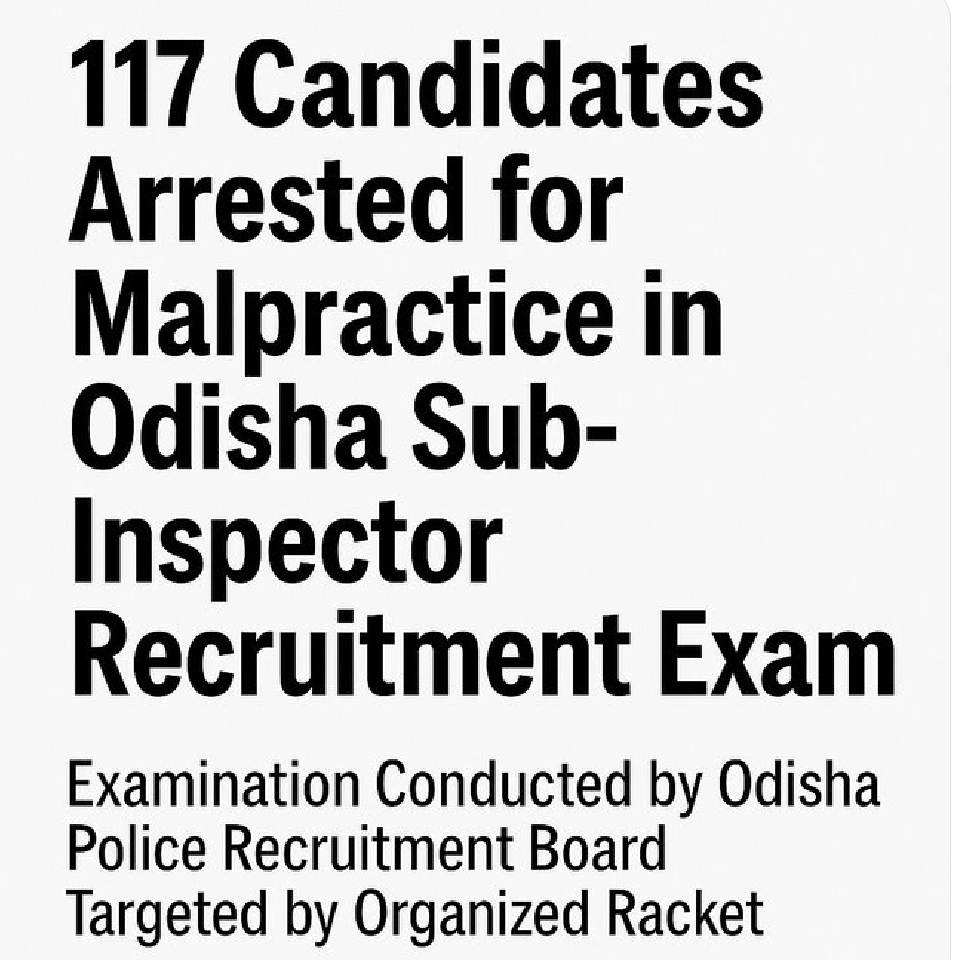Shocking Odisha Police Exam Scandal: 114 Aspirants Arrested in ₹25 Lakh Question Paper Leak Racket
Shadows of Sabotage: Unraveling the Rot in Odisha's Quest for Justice
In the dim predawn hours near the Andhra Pradesh border, where the restless hum of sleeper buses meets the silent vigil of the law, a startling tableau unfolded on October 2, 2025. Three air-conditioned chariots of desperation, ferrying 117 souls from Bhubaneswar's Baramunda, were halted by Berhampur Police. Among them, 114 young aspirants—eight women among the weary ranks—stood exposed, their dreams tangled in the web of a leaked question paper racket. Bound for Vizianagaram's shadowy underbelly, these candidates for Odisha's Sub-Inspector of Police posts had wagered ₹25 lakhs each: ₹10 lakhs upfront for the forbidden script, the balance promised upon the laurels of a tainted triumph. What began as a tip-off has swelled into a storm, with FIRs under the Odisha Public Examination (Prevention of Unfair Means) Act 2024, and the Crime Branch delving into an organized syndicate that preys on ambition like a vulture on the fallen.
This is no isolated tremor; it is the aftershock of a seismic fault line cracking through Odisha's recruitment edifice. The Combined Police Service Examination (CPSE) 2024, slated for October 5 and 6, marks the fourth casualty since July 2025—a grim ledger of betrayal. Recall the Special Odisha Teacher Eligibility Test (OTET)-2025, aborted mere hours before its July 20 dawn by a leak that ignited public fury. Or the Odisha Subordinate Staff Selection Commission's Combined Recruitment Examination, axed between July 30 and August 4 amid whispers of preliminary foul play. Even the rescheduled OTET, postponed on August 22 under the veil of "unavoidable circumstances," left aspirants adrift in a sea of frustration. Each cancellation is a ripple, but together they form a tidal wave eroding the shores of trust. As former Chief Minister Naveen Patnaik decried, these disruptions unveil "a troubling pattern," one that "undermines trust and affects lakhs of job seekers across the State." In a land where public service is the sacred covenant between the governed and the guardians, such sabotage is not mere malpractice—it is profanation.
Peel back the layers, and the anatomy of this affliction reveals a deeper malaise: a recruitment system besieged by organized crime, where question papers are commodities traded in the black market of Vizianagaram's hidden lairs. The aspirants, ensnared in this nexus of agents and middlemen, are both victims and unwitting accomplices. They board buses not with the fire of merit in their veins, but with the cold calculus of desperation—₹25 lakhs a Faustian bargain for a badge that promises security in an economy where opportunity knocks unevenly. Yet, the true architects of this shadow economy lurk beyond the arrested: a labyrinth of intermediaries, perhaps tentacles reaching into the Secretariat's hallowed halls. As the user's poignant lament echoes, a rigorous purge might unmask a startling truth—over 90% of those officers perched in air-conditioned offices, doling out justice and service, could falter without their illicit crutches. Imagine the thekadars—the post-holders sworn to uplift the marginalized—elevated not by intellect or integrity, but by the alchemy of money into position. How, then, can we envision a corruption-free society when its sentinels stand on pilings of graft?
This is the paradox of aspiration turned arson: a system designed to forge protectors devours its own. Meritocracy, that fragile ideal, crumbles under the weight of leaks, leaving behind a diaspora of disillusioned youth. Lakhs of Odia hearts, pulsing with the rhythm of dreams deferred, now beat in sync with cynicism. The economic toll is incalculable—delayed careers, squandered savings, families teetering on the brink. But the societal hemorrhage runs deeper: when the enforcers of law emerge from a forge of fraud, what faith can citizens repose in the scales of justice? A police force born of bought answers risks enforcing not equity, but the very inequities it was meant to dismantle. In this hall of mirrors, the corrupt officer becomes the unwitting mirror to a polity adrift, where service to the people morphs into servitude to the syndicate.
Yet, amid the alarm, glimmers of resolve pierce the gloom. The swift interception by Berhampur Police, led by Superintendent Saravana Vivek M, signals a vigilance that, if amplified, could cauterize these wounds. The invocation of stringent sections—319(2), 318(4), 338/336(3) of the Indian Penal Code, alongside the 2024 Act—heralds a legal bulwark against the brazen. Patnaik's outrage, a clarion from the opposition, underscores the imperative for bipartisan reckoning: not just arrests, but autopsy. Reforms must burrow deep—digital fortification of exam processes, AI-driven anomaly detection, whistleblower sanctuaries, and, crucially, a cultural transfusion that valorizes merit over mammon. Enforce the purge, not with vengeance, but vision: re-examine the Secretariat's sinecures, audit the ascent of every thekadar, and rebuild from the rubble a recruitment realm where integrity is the unyielding currency.
Odisha, cradle of ancient resilience, stands at this crossroads not as victim, but vanguard. The 114 arrested are harbingers, their buses a metaphor for journeys hijacked. Let this be the inflection: from the ashes of aborted exams, rise a phoenix of pure process. Only then can we reclaim the dream—a society where justice flows not from leaked ledgers, but from the unadulterated ink of honest endeavor. In the end, the true guardians are not those who wear the uniform, but those who ensure it is worn by the worthy. Odisha's future demands no less.
